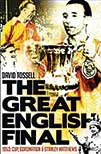 1953: Cup, Coronation and Stanley Matthews
1953: Cup, Coronation and Stanley Matthews
by David Tossell
Pitch, £16.99
Reviewed by Charles Robinson
From WSC 319 September 2013
Sixty years on, no cup final has yet matched the game in 1953 in which Blackpool beat Bolton 4-3 with a late intervention from the incomparable Stanley Matthews. In The Great English Final author David Tossell relates the full story of this famous day, weaving social and economic history with the tale of the game to great effect.
Aside from the match reports which bookend the chapters, not just of the game itself but of the rounds leading up to the final, Tossell expertly discusses a range of issues which touch on the modern game. In one chapter, he addresses players’ wages and the challenges that big-name stars, such as Stan Mortensen – scorer of a hat-trick in the 1953 final – went through to secure a decent wage and to protect themselves against their inevitable and oncoming retirement. Although, in Matthews’s case, that wouldn’t happen for a few years yet.
Another topic that exercises Tossell is that of the supposed tactical naivety of British football in the post-war period. As he explains, 1953 was the year not only of the coronation of Elizabeth II but also the year of England’s famous and chastening defeat by Hungary. This disastrous result could have heralded a period of deep introspection, of the kind wished for by many England fans today. However, the author argues that English football fans were more concerned with entertainment than with sophisticated displays of tactical ingenuity after many years of war, hardship and suffering.
Despite that, Tossell also highlights the reckless attacking philosophy of the Blackpool manager Joe Smith, at the same time revealing the profound differences between the methods of managers in that post-war period to our own. The captain of the team was much more significant in those days and a delightful early chapter on Blackpool skipper Harry Johnston demonstrates this.
Of course, the book leans towards Blackpool, Matthews and his incredible achievements. The narrative is compelling, as the 38-year-old Matthews, a defeated Wembley finalist twice before, defies age to claim the medal that he promised his father on his deathbed. Interestingly, Tossell also uses contemporary analysis of the game, using Opta statistics to show that Matthews was, in fact, not the most effective player on the field. Ernie Taylor, Mortensen and Bolton’s Willie Moir, among others, were all more productive according to the modern analysis.
Nonetheless, the final is fittingly described as the Matthews Final. Tossell derides the contemporary media for skewing and distorting any soundbite from players and managers so as to fit in to some predetermined story. But the Matthews tale gripped the nation and even the Bolton players and supporters celebrated with him. Matthews was a genuine star before the media obsession with football and the cult of celebrity that blights the modern game. Tossell, rightly shortlisted many times for the British Sports Book awards, tells a riveting story of social and sporting history, weaving his narrative strands inwards towards that famous late goal scored not by Matthews, but by one Bill Perry, another forgotten hero of that famous day.